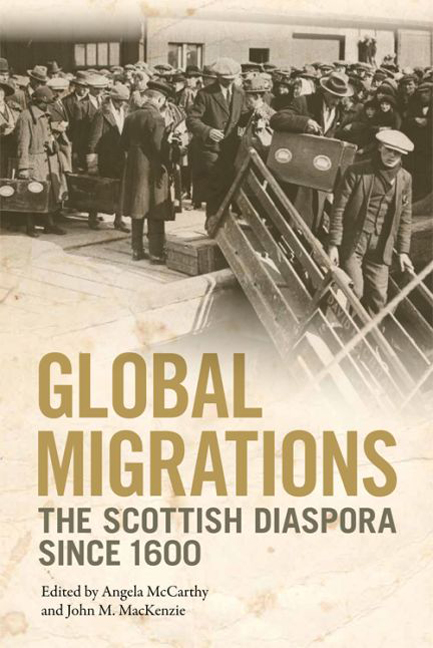Book contents
- Frontmatter
- Contents
- List of Figures and Tables
- Notes on the Contributors
- Acknowledgements
- A Tribute to Sir Tom Devine
- 1 Introduction-Global Migrations: The Scottish Diaspora since 1600
- 2 ‘As Hewers of Wood, and Drawers of Water’: Scotland as an Emigrant Nation, c. 1600 to c. 1800
- 3 ‘You Have Only Seen the Fortunate Few and Draw Your Conclusion Accordingly’: Behavioural Economics and the Paradox of Scottish Emigration
- 4 Scottish Diasporas and Africa
- 5 ‘Have the Scotch no Claim upon the Cherokee?’ Scots, Indians and Scots Indians in the American South
- 6 Conflicts of Interest, Crises of Conscience: Scots and Aboriginal People in Eastern Australia, 1830s–1861
- 7 The Importance of Scottish Origins in the Nineteenth Century: James Taylor and Ceylon Tea
- 8 ‘Our Old World Diff'rences are Dead’: The Scottish Migrant Military Tradition in the British Dominions during the First World War
- 9 ‘Part of my Heritage’: Ladies’ Pipe Bands, Associational Culture and ‘Homeland’ Identities in the Scottish Diaspora
- 10 Understanding Scottishness among Sojourners, Settlers and Descendants in Hong Kong and New Zealand
- 11 Encountering an Imaginary Heritage: Roots Tourism and the Scottish Diaspora
- 12 Home is where the Heart is: Affinity Scots in the Scottish Diaspora
- 13 What Scottish Diaspora?
- 14 Afterword
- Index
9 - ‘Part of my Heritage’: Ladies’ Pipe Bands, Associational Culture and ‘Homeland’ Identities in the Scottish Diaspora
Published online by Cambridge University Press: 23 September 2017
- Frontmatter
- Contents
- List of Figures and Tables
- Notes on the Contributors
- Acknowledgements
- A Tribute to Sir Tom Devine
- 1 Introduction-Global Migrations: The Scottish Diaspora since 1600
- 2 ‘As Hewers of Wood, and Drawers of Water’: Scotland as an Emigrant Nation, c. 1600 to c. 1800
- 3 ‘You Have Only Seen the Fortunate Few and Draw Your Conclusion Accordingly’: Behavioural Economics and the Paradox of Scottish Emigration
- 4 Scottish Diasporas and Africa
- 5 ‘Have the Scotch no Claim upon the Cherokee?’ Scots, Indians and Scots Indians in the American South
- 6 Conflicts of Interest, Crises of Conscience: Scots and Aboriginal People in Eastern Australia, 1830s–1861
- 7 The Importance of Scottish Origins in the Nineteenth Century: James Taylor and Ceylon Tea
- 8 ‘Our Old World Diff'rences are Dead’: The Scottish Migrant Military Tradition in the British Dominions during the First World War
- 9 ‘Part of my Heritage’: Ladies’ Pipe Bands, Associational Culture and ‘Homeland’ Identities in the Scottish Diaspora
- 10 Understanding Scottishness among Sojourners, Settlers and Descendants in Hong Kong and New Zealand
- 11 Encountering an Imaginary Heritage: Roots Tourism and the Scottish Diaspora
- 12 Home is where the Heart is: Affinity Scots in the Scottish Diaspora
- 13 What Scottish Diaspora?
- 14 Afterword
- Index
Summary
INTRODUCTION
THROUGHOUT THE IMPERIAL AND non-imperial destinations to which Scots gravitated, they expressed their ethnic identities in various ways, including the founding of Caledonian societies, the building of memorials and statues, and the organisation of festivals such as Highland Games and pipe band competitions. Angela McCarthy explains that although scholars are alert to these components, they have generally focused either on one particular aspect, such as ethnic societies, or fleetingly mentioned such elements without sustained analysis. For many ladies’ pipe band members, and indeed other members of Scottish groups, their association was linked – to varying degrees – to a sense of Scottish ethnicity. This chapter will extend this scholarship by surveying Scottish ethnic identities through two approaches: public group expressions of Scottishness, as revealed by ladies’ pipe bands and their various connections to other forms of Scottish associational culture; and personal expressions of individual band members. It therefore engages with established research on associational culture, but also emphasises personal articulations of Scottishness. This central objective is important, for, while
Scottish associational culture was critical for some, it alone cannot shape our understanding of ethnic identities, Scottish or otherwise. Indeed, given that most Scottish migrants did not join a Scottish association, it was their personal sense of Scottishness which overshadowed their ethnic affiliations.
As sociologist David McCrone puts it, ‘Perhaps too much attention is paid to the identity labels that people are “forced” to wear, and not enough on how they select and actively present themselves to others.’
This chapter draws on a larger study which examined ten ladies’ pipe bands across Scotland and its diaspora (Australia, Canada, England and New Zealand) between 1918 and 2012. It uses as evidence interviews conducted both in person, and where necessary, by email. The ages of the interview subjects vary, with most of these women beginning their piping hobbies as teenagers (mostly around twelve to eighteen years old) in the late 1940s and throughout the 1950s and 1960s. Their current ages therefore range between fifty-six and ninety-two, reflecting a sampling of musicians in age and association to a Scottish descent group. All these interviewees were recruited through social networking. In Australia, no former members could be located, and in England, no interest could be summoned.
- Type
- Chapter
- Information
- Global MigrationsThe Scottish Diaspora since 1600, pp. 159 - 176Publisher: Edinburgh University PressPrint publication year: 2016



